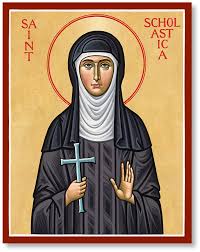HOMILY WEEK 05 04 – Year II
Humble Faith in Action: Memorial of St. Scholastica
(1 Kg 11:4-13; Ps 106; Mk 7:24-30)
*************************************************
In today’s first reading, the famous King Solomon lost his mind in old age and fell into idolatry in an attempt to please his wives, even though God had appeared to him to chastise and try to correct him.
On the other hand, the foreigner in the gospels, a Syrophoenician woman who had been raised in a world of idolatry, was able to recognize Jesus had divine power to heal. She was able to set aside her attachment to the gods of her culture, lower herself to a humble state, and put her faith in Jesus. Amazingly, she got it right when most of Israel did not get it at all.
We may take a bit of offense at the seemingly harsh comment of Jesus about taking the children’s food and throwing it to the dogs. The Cree language can help us here. The word for dog is atim. The word for puppy is a more affectionate, softer version, acimosis. I suspect that was the word Jesus was using in this case. And the woman, undeterred, was able to pick up on that endearing gesture to convince Jesus to heal her daughter.
In another gospel account, she addresses Jesus as both Lord and Son of David, implying that yes, she understood he was first to go to the Jews as Son of David, but she believed he was also Lord of all people, so why not move things up and heal her gentile daughter now! I think it was that wise faith that touched Jesus’ heart and moved him to act on her behalf. As Jesus put it in other gospel incidents – “I have not seen such faith in all of Israel” and “The children of this world are wiser than the children of Israel.”
We have perhaps been too much like Solomon and need to be more like the Syrophoenician woman, letting go of our own false idols, putting our faith in Jesus and helping each other to journey toward healing. The idols we face are the same ones Jesus faced in the desert – an inordinate focus on possessions and pleasure, a selfish need for prestige and fame, and the abuse of power and control.
This encounter is an example of inter-religious dialogue in which Jesus allows himself to be influenced by the prayers of a gentile, which would be shocking to the Jews, and perhaps is still shocking to some cradle Catholics to this day. Her persistence is also an example of the power of persevering in prayer, very much like Monica who prayed for her son Augustine for over twenty years, and the Martins who prayed that their children would become saints. Several of their children joined religious life, and their youngest is one of our most beloved saints: Thérèse of Lisieux.
The gospel passage is also an example of faith in action. There are times when faith means having the determination to fight through obstacles, until we see the outcome we believe God wants to give us. There are times when we need to couple faith with strength of will. After praying for a job, we need to check the want ads. After praying for a relationship to be healed, we need to strive to be the answer to our own prayer by being the first to take a step toward reconciliation with an estranged friend. If anything, God applauds these actions because they show we are putting our faith into action, and trusting God will be with us when we step out and act.
 Today the church honors another humble person who lived this message. Scholastica was the twin sister of St. Benedict, the founder of Western monasticism, and she was the leader of a women’s community likely located near Benedict’s monastery at Monte Cassino. What little is known about her life is found in St. Gregory the Great’s book, the second Dialogue, which is an account of her brother’s miracles. One of her miracles occurred when she was visiting her brother. When he was reluctant to have her stay longer, she prayed and instantly a storm came up preventing her from leaving, so they stay together longer conversing about holy things! She died about 543 and was buried in Benedict’s tomb, where he joined her in death soon after. She is the patron of nuns – especially Benedictines – and children with convulsive disorders.
Today the church honors another humble person who lived this message. Scholastica was the twin sister of St. Benedict, the founder of Western monasticism, and she was the leader of a women’s community likely located near Benedict’s monastery at Monte Cassino. What little is known about her life is found in St. Gregory the Great’s book, the second Dialogue, which is an account of her brother’s miracles. One of her miracles occurred when she was visiting her brother. When he was reluctant to have her stay longer, she prayed and instantly a storm came up preventing her from leaving, so they stay together longer conversing about holy things! She died about 543 and was buried in Benedict’s tomb, where he joined her in death soon after. She is the patron of nuns – especially Benedictines – and children with convulsive disorders.
The Eucharist is our greatest prayer and an act of humble faith in the presence of Jesus who heals us through both Word and sacrament. May our celebration deepen our faith, empower us to let go of any false idols in our lives, heal us where healing is needed, and send us out to put our faith into action as did all the saints.



